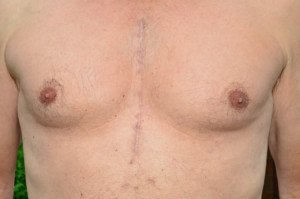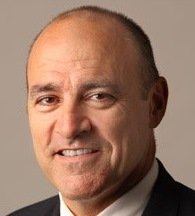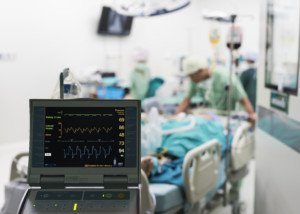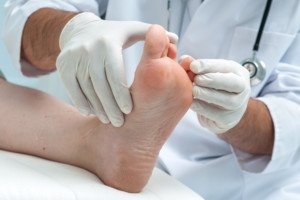
Still having chest pain even after your coronary bypass surgery?
It’s understandable for a person, fresh from coronary bypass surgery, or even several weeks out, to think he’s having a heart attack or something wrong with his heart, when he has chest pain.
“Chest wall pain after cardiac surgery may normally last 3-6 weeks, but may last as long as 12 weeks on rare occasions,” says Dr. Michael Fiocco, Chief of Open Heart Surgery at Union Memorial Hospital in Baltimore, Maryland, one of the nation’s top 50 heart hospitals.
Think of it this way:
A surgeon just cut open your chest. This involves “cracking” open the sternum and using a crank-like device to pry it apart to expose the sac that surrounds the heart.

Source: Shutterstock/mountainpix
After the bypass surgery, the surgeon reattaches the sternum, which is bone, using wire. Of course you will have chest pain after bypass surgery!
Dr. Fiocco explains, “This pain has a different quality from angina and most patients know the difference without question.
“Post-op pain is also related to movement, coughing, and normally can be reproduced with palpation of the chest wall, none of which occur with ischemic pain (angina).”
Palpation means feeling and pressing with your fingers against your chest.
“It’s extremely rare to have angina following CABG (coronary artery bypass grafting), and differentiating between angina and post-op pain should be simple with just a physical exam,” continues Dr. Fiocco.
Think of coronary bypass surgery as new plumbing for your heart.
The new plumbing (veins harvested from your leg and/or arm) is free of the clogging and blockage that necessitated the operation in the first place.
As a result, oxygenated blood easily flows through these vessels, supplying your heart with oxygen.
Angina is chest pain that results from restricted blood (oxygen) flow to the heart.
Thus, the discomfort you feel following coronary bypass surgery, like Dr. Fiocco says, is typically related to motion and coughing. Coughing creates motion of the chest wall, which was just cut open.
Movement such as shifting positions in bed or even taking a deep breath, causes the chest cavity to expand or lift.
It was just operated on; chest pain is to be expected.
The chest pain may seemingly come and go for no apparent reason, but even subtle motion can bring it on.
Don’t let chest pain, that follows coronary bypass surgery, alarm you, even if you’re experiencing it weeks after.
However, it’s important to note concerning discomfort to your surgeon and cardiologist.

Dr. Fiocco specializes in treating artery disease, valvular disease and aortic aneurysm. His heart care expertise has earned him recognition by Baltimore Magazine as a Top Doctor in 2010, 2011, 2013, 2016 and 2017.
 Lorra Garrick has been covering medical, fitness and cybersecurity topics for many years, having written thousands of articles for print magazines and websites, including as a ghostwriter. She’s also a former ACE-certified personal trainer.
Lorra Garrick has been covering medical, fitness and cybersecurity topics for many years, having written thousands of articles for print magazines and websites, including as a ghostwriter. She’s also a former ACE-certified personal trainer.
.
Top image: Shutterstock/Photographee.eu
Coronary Bypass Surgery Post-op Complications that Seem Scary
Coronary Bypass Surgery: What Patient Looks Like Right After









